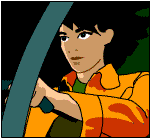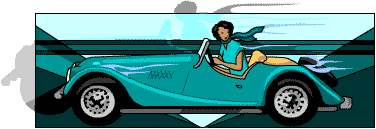Dream Cars
Created | Updated Jan 28, 2002
Cars are so commonplace and such an indispensable part of modern life that we experience them as extensions to our own personality: we identify with them, lavish attention on them, and project our fantasies into them. As such, car dreams can inform about the dreamer's self-image, providing insight into how the dreamer is living his/her life.

A dream about driving a fast red Ferrari, for instance, suggests self-confidence, exuberance and being in control of one's destiny. On the other hand, a dream of driving an old jalopy may suggest the reverse.
As a mechanical way of moving through life car dreams represent the controlling force 'driving' the dreamer on. In contrast, walking, running, swimming and cycling are all self-sufficient, proactive and personal modes of progression, owing their movement entirely to will and physical effort. When you walk, for instance, you are travelling 'under one's own steam,' slowed down and in much closer contact with nature, feeling the earth, trees and air around you. In cycling, one steers one's own course without relying on a combustible engine. Such dream images can be about developing independence and autonomy, the more 'natural' form of transport indicating you are more in control of your life and know how to achieve goals.
In car dreams, it is important to note whether the dreamer is behind the wheel of the vehicle or merely a passenger observing events. If there are passengers, they may serve to influence progress, give encouragement or criticise the driver, as often happens in outer life. How effectively the dreamer copes with the journey - whether driving erratically or safely, alert and responsive to danger - can say much about the dreamer's adjustment to life and their personal development.
Considerations such as the make and colour of car, state of the vehicle, the power of its engine, and, the efficiency of its brakes, all have important symbolic significance. Whether the car is open-topped, overloaded, on/off the road, running out of fuel, or, broken down may also yield important clues to the dreamer's psychological state.

The bodywork, steering and engine have a special significance in car dreams. The bodywork may represent the public image or persona1; the engine, the innner Self2; and, the steering, the ego control the dreamer exerts over his or her life.
A dream of driving a car with broken steering where danger of a serious collision is imminent suggests the dreamer feels powerless in some aspect of life, and may be afraid of an impending accident or disaster on the outside. A dream about mechanical failure on a deserted road miles from anywhere may denote a lack of self-confidence and/or emotional isolation. Perhaps more seriously, engine failure is symbolic of an inner crises: the dreamer feels at a standstill, dis-connected from life, perhaps feeling alone and frustrated, and the deserted road may indicate anxieties about their being no one to turn to for solace, support or guidance.
A General Approach to Car Dreams
Dreams are subtle creatures of the night and are specific to the dreamer, making it difficult to speak about dream images in generalities. Dreams also should not to be taken too literally since they speak a symbolic, metaphorical language. As a rule of thumb, their 'meaning' is derived from the context of the dream, and the personal associations and the particular psychic situation of the dreamer.
At first encounter, dreams can seem utterly impenetrable. However, adopting an attitude of 'befriending' and listening to the dream, 'sticking' with its images and letting it speak for itself can, as in normal relationships, prove to be productive and beneficial. Because the dream emanates from the 'primitive' unconscious and expresses itself indirectly by means of metaphor, it is recommended to suspend disbelief, thus avoid taking its images too literally. This desire to take dreams literally reflects the dream ego's3 reluctance to relinquish control, being particularly pertinent to car symbolism.
According to the analytical psychologist, C.G. Jung, dream behaviour is often at variance with, and oppositional to, our conscious intentions, the dream then serving as compensatory to the one-sidedness of conscious life. Employing the concept of compensation thus brings the unconscious into relation with consciousness, and provides what is needed to restore psychic balance.
Dream Examples
The following dream, and the interpretive method, are offered by way of applying the above principles into practice.
"I am driving a large car with a heavy load in tow through a main high street in my home town. I see ahead of me a police road check. The police wear reflective bands on their uniforms. As I approach the Town Hall junction, I begin to lose control of the vehicle, even though I am slowing down. The car veers to the right. I become anxious and know that I will get stopped."
The main themes in the dream are: carrying a heavy load, the police road check, difficulty steering, and anxiety about losing control.
There is a reciprocal relationship between the 'laws of control' and the 'control of law.' From the ego's perspective 'lawful control' (i.e. keeping the right side of the law) can become the driving force in outer life. Taken to excess, this position may infringe underworld values. To the dayworld perspective, such values can appear lawless and uncontrollable, even anarchic and amoral. But the underworld's inherent laws are paradoxically 'natural,' having an innate intelligence, its own checks and balances. There is thus no natural transposition of values from the outer to the inner realm of existence.

The dream ego is seen to be controlling one's drive, one's ego consciousness as 'drive,' pushing forward and constellating its opposite. The dream police stop progression forward, creating psychic inertia. Applying the brakes and swerving is a reminder that one's path and direction in life is not necessarily straight or 'higher' ('high street'). The ego's drive can equate with an inflated position. The police as the enforcers of underworld laws, and as collective psychic figures, are those most bound to our literal perspective and our non-metaphorical perceptual world. They have an 'arresting' effect. Kronos (Saturn), the god of law and order, of boundaries and restrictions, brings one to a standstill, 'arresting' progress or psychic movement. What is the 'penalty' for deviating from the path of psychic law. The police, as collective psychic figures, are those most bound to our literal perspective and our non-metaphorical perceptual world.
The image of 'stopping' provides a reflective moment, 'seeing through' the ego's attachments to the upperworld reality; a pulling back into the shadowlands, the foreign ground of our being.
Being pulled toward the dark right side of the road, having to slow down in order to deviate. A 'deviating' move must be made to see the deviancy in things, relinquishing control to witness one's own deviant behaviour. This deviant perspective is a challenge to the concrete world of 'norms.'
The approaching junction is at the town's centre, indicating the heart of the matter. A major crossroads or checkpoint is reached, signifying a turning point in life. The waking ego's heavy load is excessive, burdensome and unstable. It largely accounts for the deviation. This alludes to the heavy weight of ego responsibility - the baggage we carry behind us, which may need sorting. I am mindful of Hecate, goddess of crossroads, a place where consciousness is crossed by the unconscious - a place to surrender and discard one's 'rubbish.' A place for giving life back to death and return death back to life, thus a place of renewal.
